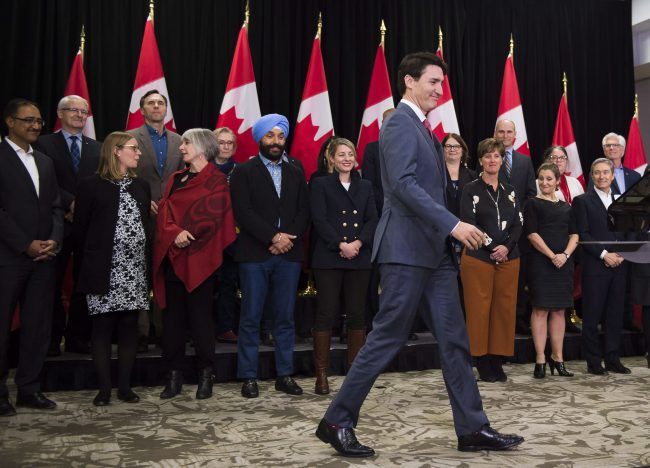Every conference has some constants: long days, complaints about coffee (quantity and/or quality) and guest speakers, to name a few. A retreat for the most powerful politicians is no exception. So just who is enlightening our country’s top decision makers as they plan for Canada’s future? A couple of players they’ve heard from before.

Sir Michael Barber is the architect of the phrase “deliverology.” He developed the concept in the United Kingdom in Tony Blair’s administration and, according to his website, he’s worked on “public service delivery” in more than 50 countries.
Just what does that mouthful mean? Barber’s company, Delivery Associates, describes deliverology as both an art and a science, “the system that helps leaders deliver long-lasting and meaningful results.” Put simply, he’s in London, Ont., and at multiple Trudeau cabinet meetings before this one, to help the government deliver on its promises.
At the retreat in Sudbury, Ont. in the summer of 2016, Barber said that in order to generate results, the next year should be spent focused on “relentless implementation.”
READ MORE: Justin Trudeau, ministers warned harder decisions loom
Did that happen? Following the tenets of deliverology, the Trudeau government launched its mandate tracker to show Canadian where they are on progress. It’s been criticized as too much of a pat on the back.
- Can you tell fake alcohol from real? Why methanol is so hard to detect
- Halifax Walmart death: Store will not reopen for ‘weeks’ as remodelling continues
- Will Canada’s tax ‘holiday’ create a ‘mess’ for businesses? Some say yes
- Alberta seeks to ‘de-risk’ oil, gas pipeline investments in wake of Trump victory
No question there’s still a lot of work ahead to make good on promises. The July 1st deadline for legalizing marijuana looms large. And some big ticket items have been abandoned altogether. Electoral reform, for one. Prime Minister Justin Trudeau told a town hall Thursday night, “I wasn’t going to do something that I felt would harm Canada … just to tick a box off on an electoral platform.”
WATCH: Prime Minister faces questions and hecklers

Another big promise that’s fallen by the wayside: balancing the federal budget by 2019. Speaking to reporters at the retreat, Finance Minister Bill Morneau said this about the upcoming spring budget: “We’re going to be thinking about how we can make sure that women are successful in Canada… we’re going to be thinking carefully about how we can continue to focus on long-term success for Canada, so science is an important part of our budget.” He added job security was also on the list, as society deals with a rise in the use of automation.
No mention of balanced books.

Get daily National news
READ MORE: Trudeau defends slow pace of his government’s legislative activity
Behind closed doors at this retreat, Barber led another session with cabinet ministers. Just what does he think of the Trudeau government’s broken promises, and how well they’ve used deliverology for “relentless implementation?” We don’t know – Global News did not get a response to multiple interview requests. He’s spoken to the media at previous retreats, if that gives any hints.
Then there’s guest speaker number two – Dominic Barton was tapped to lead Morneau’s advisory council on economic growth in 2016. He’s the global managing partner at the highly-regarded management consultant firm McKinsey. Since then, the council put out three reports with bold recommendations. They’re framed around major challenges facing Canada: an ageing population, disruption in technology, and global economic power quickly shifting to Asia.
WATCH: Jobs that are growing in importance for the Canadian economy: Indeed

Last month’s final report took stock of how the government has done with those recommendations. The boldest was immigration: Barton’s council recommended increasing the number of immigrants from 270,000 to 450,000 over five years, with an additional 75,000 economic immigrants annually by 2021. The most recent government plan will see a rise in general immigration levels to 340,000 in 2020.
“While this is short of our recommendation, it is a step in the right direction. The plan calls for economic immigrants to form the bulk of the increase — such new Canadians are an important driver of growth,” notes the report.
The government did complete another big recommendation – launching the Canada Infrastructure Bank by the end of 2017. The new arm’s-length Crown corporation will invest $35 billion from the federal government into infrastructure projects, such as public transit and those that promote renewable energy, hoping they’re attractive enough to get private and institutional investments on board. A spokesperson for the Minister of Infrastructure and Communities confirmed it’s up and running.
READ MORE: Liberals can’t move cash fast enough out of federal treasury for infrastructure projects
But a similar council-recommended project is not up and running – the Invest in Canada hub. It was also slated to be off the ground by the end of 2017. When we asked if it was, a spokesperson for Global Affairs Canada told us the $218 million project will “create a new agency focused on streamlining and encouraging investment in Canada,” and will include hiring 25 new Trade Commissioners over the next three years, who will target “strategic markets around the world.” Global News asked again when it would be rolled out – and got no response.
Barton addressed cabinet on the second and final day of the cabinet retreat, and was also unavailable for an interview.
Read the economic council reports here.








Comments